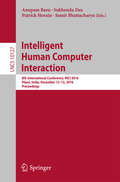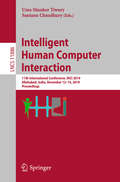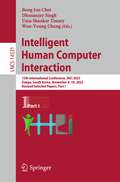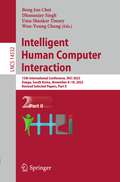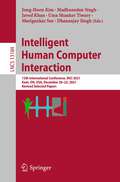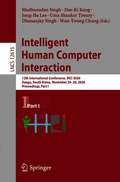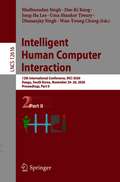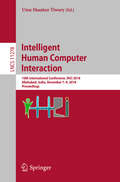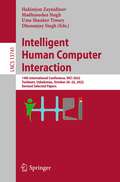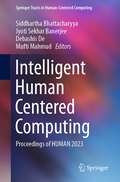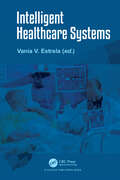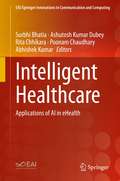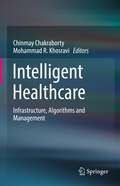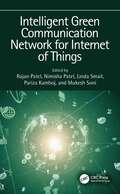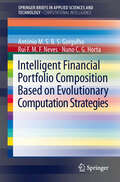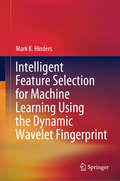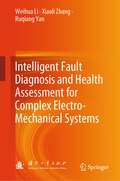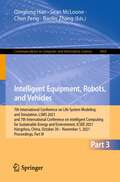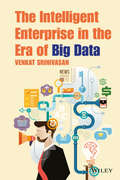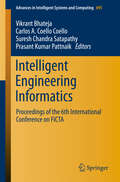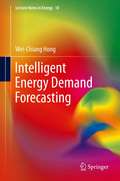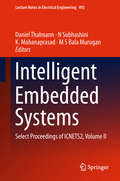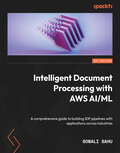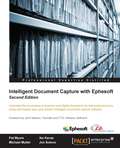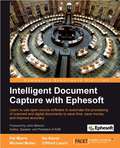- Table View
- List View
Intelligent Human Computer Interaction
by Anupam Basu Sukhendu Das Patrick Horain Samit BhattacharyaThis book constitutes the proceedings of the 8th International Conference on Intelligent Human Computer Interaction, IHCI 2016, held in Pilani, India, in December 2016. The 22 regular papers and 3 abstracts of invited talks included in this volume were carefully reviewed and selected from 115 initial submissions. They deal with intelligent interfaces; brain machine interaction; HCI applications and technology; and interface and systems.
Intelligent Human Computer Interaction: 11th International Conference, IHCI 2019, Allahabad, India, December 12–14, 2019, Proceedings (Lecture Notes in Computer Science #11886)
by Santanu Chaudhury Uma Shanker TiwaryThis volume constitutes the proceedings of the 11th International Conference on Intelligent Human Computer Interaction, IHCI 2019, held in Allahabad, India, in December 2019. The 25 full papers presented in this volume were carefully reviewed and selected from 73 submissions. The papers are grouped in the following topics: EEG and other biological signal based interactions; natural language, speech and dialogue processing; vision based interactions; assistive living and rehabilitation; and applications of HCI.
Intelligent Human Computer Interaction: 15th International Conference, IHCI 2023, Daegu, South Korea, November 8–10, 2023, Revised Selected Papers, Part I (Lecture Notes in Computer Science #14531)
by Bong Jun Choi Dhananjay Singh Uma Shanker Tiwary Wan-Young ChungThis book constitutes the refereed proceedings of the 15th International Conference on Intelligent Human Computer Interaction, IHCI 2023, held in Daegu, South Korea, during November 8–10, 2023.The 55 full papers and 16 short papers included in this book were carefully reviewed and selected from 139 submissions. They were organized in topical sections as follows: Volume I: Natural Language and Dialouge Systems, Affective Computing and Human Factors, Human Centred AI, Human-Robot Interaction and Intelligent Interfaces and User Centred Design.Volume II: AI and Big Data, Deep Learning, Intelligent Systems, Mobile Computing and Ubiquitous Interactions and Social Computing and Interactive Elements.
Intelligent Human Computer Interaction: 15th International Conference, IHCI 2023, Daegu, South Korea, November 8–10, 2023, Revised Selected Papers, Part II (Lecture Notes in Computer Science #14532)
by Bong Jun Choi Dhananjay Singh Uma Shanker Tiwary Wan-Young ChungThis book constitutes the refereed proceedings of the 15th International Conference on Intelligent Human Computer Interaction, IHCI 2023, held in Daegu, South Korea, during November 8–10, 2023.The 55 full papers and 16 short papers included in this book were carefully reviewed and selected from 139 submissions. They were organized in topical sections as follows: Volume I: Natural Language and Dialouge Systems, Affective Computing and Human Factors, Human Centred AI, Human-Robot Interaction and Intelligent Interfaces and User Centred Design.Volume II: AI and Big Data, Deep Learning, Intelligent Systems, Mobile Computing and Ubiquitous Interactions and Social Computing and Interactive Elements.
Intelligent Human Computer Interaction: 13th International Conference, IHCI 2021, Kent, OH, USA, December 20–22, 2021, Revised Selected Papers (Lecture Notes in Computer Science #13184)
by Jong-Hoon Kim Madhusudan Singh Javed Khan Uma Shanker Tiwary Marigankar Sur Dhananjay SinghThis volume constitutes the refereed proceedings of the 13th International Conference on Intelligent Human Computer Interaction, IHCI 2021, which took place in Kent, OH, USA, in December 2021. The 59 full and 9 short papers included in these proceedings were carefully reviewed and selected from a total of 142 submissions. The papers were organized in topical sections named human centered AI; and intelligent interaction and cognitive computing
Intelligent Human Computer Interaction: 12th International Conference, IHCI 2020, Daegu, South Korea, November 24–26, 2020, Proceedings, Part I (Lecture Notes in Computer Science #12615)
by Madhusudan Singh Dae-Ki Kang Jong-Ha Lee Uma Shanker Tiwary Dhananjay Singh Wan-Young ChungThe two-volume set LNCS 12615 + 12616 constitutes the refereed proceedings of the 12th International Conference on Intelligent Human Computer Interaction, IHCI 2020, which took place in Daegu, South Korea, during November 24-26, 2020.The 75 full and 18 short papers included in these proceedings were carefully reviewed and selected from a total of 185 submissions. The papers were organized in topical sections named: cognitive modeling and system; biomedical signal processing and complex problem solving; natural language, speech, voice and study; algorithm and related applications; crowd sourcing and information analysis; intelligent usability and test system; assistive living; image processing and deep learning; and human-centered AI applications.
Intelligent Human Computer Interaction: 12th International Conference, IHCI 2020, Daegu, South Korea, November 24–26, 2020, Proceedings, Part II (Lecture Notes in Computer Science #12616)
by Madhusudan Singh Dae-Ki Kang Jong-Ha Lee Uma Shanker Tiwary Dhananjay Singh Wan-Young ChungThe two-volume set LNCS 12615 + 12616 constitutes the refereed proceedings of the 12th International Conference on Intelligent Human Computer Interaction, IHCI 2020, which took place in Daegu, South Korea, during November 24-26, 2020.The 75 full and 18 short papers included in these proceedings were carefully reviewed and selected from a total of 185 submissions. The papers were organized in topical sections named: cognitive modeling and systems; biomedical signal processing and complex problem solving; natural language, speech, voice and study; algorithms and related applications; crowd sourcing and information analysis; intelligent usability and test system; assistive living; image processing and deep learning; and human-centered AI applications.
Intelligent Human Computer Interaction: 10th International Conference, IHCI 2018, Allahabad, India, December 7–9, 2018, Proceedings (Lecture Notes in Computer Science #11278)
by Uma Shanker TiwaryThis book constitutes the thoroughly refereed proceedings of the 10th International Conference on Intelligent Human Computer Interaction, IHCI 2018, held in Allahabad, India, in December 2018. The 28 regular papers presented were carefully reviewed and selected from 89 submissions. The papers have been organized in the following topical sections: ECG, EEG -based and Other Multimodal Interactions; Natural Language, Speech and Dialogue Processing; Modeling Human Cognitive Processes and Simulation; Image and Vision Based Interactions; and Applications of HCI.
Intelligent Human Computer Interaction: 14th International Conference, IHCI 2022, Tashkent, Uzbekistan, October 20–22, 2022, Revised Selected Papers (Lecture Notes in Computer Science #13741)
by Hakimjon Zaynidinov Madhusudan Singh Uma Shanker Tiwary Dhananjay SinghThis book constitutes the refereed proceedings of the 14th International Conference on Intelligent Human Computer Interaction, IHCI 2022, held in Tashkent, Uzbekistan, during October 20–22, 2022. The 47 full papers and 13 short papers included in this book were carefully reviewed and selected from 148 submissions. They were organized in topical sections as follows: Bio-inspired Computing; Cognitive computing; Human Centered AI; Intelligent Technology for Post-Covid and Web Frameworks.
Intelligent Human Centered Computing: Proceedings of HUMAN 2023 (Springer Tracts in Human-Centered Computing)
by Siddhartha Bhattacharyya Jyoti Sekhar Banerjee Debashis De Mufti MahmudThis book features high-quality research papers presented at the First Doctoral Symposium on Human Centered Computing (HUMAN 2023), jointly organized by Computer Society of India, Kolkata Chapter and Techno India University, West Bengal, on February 25, 2023. This book discusses the topics of modern human centered computing and its applications. The book showcases the fusion of human sciences (social and cognitive) with computer science (human–computer interaction, signal processing, machine learning, and ubiquitous computing).
Intelligent Healthcare Systems
by Vania V. EstrelaThe book sheds light on medical cyber-physical systems while addressing image processing, microscopy, security, biomedical imaging, automation, robotics, network layers’ issues, software design, and biometrics, among other areas. Hence, solving the dimensionality conundrum caused by the necessity to balance data acquisition, image modalities, different resolutions, dissimilar picture representations, subspace decompositions, compressed sensing, and communications constraints. Lighter computational implementations can circumvent the heavy computational burden of healthcare processing applications. Soft computing, metaheuristic, and deep learning ascend as potential solutions to efficient super-resolution deployment. The amount of multi-resolution and multi-modal images has been augmenting the need for more efficient and intelligent analyses, e.g., computer-aided diagnosis via computational intelligence techniques. This book consolidates the work on artificial intelligence methods and clever design paradigms for healthcare to foster research and implementations in many domains. It will serve researchers, technology professionals, academia, and students working in the area of the latest advances and upcoming technologies employing smart systems’ design practices and computational intelligence tactics for medical usage. The book explores deep learning practices within particularly difficult computational types of health problems. It aspires to provide an assortment of novel research works that focuses on the broad challenges of designing better healthcare services.
Intelligent Healthcare: Applications of AI in eHealth (EAI/Springer Innovations in Communication and Computing)
by Surbhi Bhatia Ashutosh Kumar Dubey Rita Chhikara Poonam Chaudhary Abhishek KumarThis book fosters a scientific debate for sophisticated approaches and cognitive technologies (such as deep learning, machine learning and advanced analytics) for enhanced healthcare services in light of the tremendous scope in the future of intelligent systems for healthcare. The authors discuss the proliferation of huge data sources (e.g. genomes, electronic health records (EHRs), mobile diagnostics, and wearable devices) and breakthroughs in artificial intelligence applications, which have unlocked the doors for diagnosing and treating multitudes of rare diseases. The contributors show how the widespread adoption of intelligent health based systems could help overcome challenges, such as shortages of staff and supplies, accessibility barriers, lack of awareness on certain health issues, identification of patient needs, and early detection and diagnosis of illnesses. This book is a small yet significant step towards exploring recent advances, disseminating state-of-the-art techniques and deploying novel technologies in intelligent healthcare services and applications.Describes the advances of computing methodologies for life and medical science data;Presents applications of artificial intelligence in healthcare along with case studies and datasets;Provides an ideal reference for medical imaging researchers, industry scientists and engineers, advanced undergraduate and graduate students, and clinicians.
Intelligent Healthcare: Infrastructure, Algorithms and Management
by Chinmay Chakraborty Mohammad R. KhosraviThe book Intelligent Healthcare: Infrastructure, Algorithms, and Management® cover a wide range of research topics on innovative intelligent healthcare solutions and advancements with the latest research developments. Data analytics are relevant for healthcare to meet many technical challenges and issues that need to be addressed to realize this potential. The advanced healthcare systems have to be upgraded with new capabilities such as data analytics, machine learning, intelligent decision making, and more professional services. The Internet of Things helps to design and develop intelligent healthcare solutions assisted by security, data analytics, and machine learning.This book will provide federated learning, Data-driven infrastructure design, analytical approaches, and technological solutions with case studies for smart healthcare. This book aims to attract works on multidisciplinary research spanning across computer science and engineering, environmental studies, services, urban planning and development, Healthcare, social sciences, and industrial engineering on technologies, case studies, novel approaches, and visionary ideas related to data-driven innovative learning and computing solutions and big medical data-powered applications to cope with the real-world challenges for building smart healthcare sectors.Main Features:Ø Immersive technologies in healthcareØ Internet of medical thingsØ Federated learning algorithmsØ Explainable AI in Pervasive HealthcareØ New management principles using biomedical dataØ Secured healthcare management systemsThis book aims to set up a better understanding of data scientists, researchers, and technologists under innovative digital health. The reader can find out existing research challenges, current market trends, and low-cost technologies to smoothly address the digital health issue.
Intelligent Green Communication Network for Internet of Things
by Rajan Patel Nimisha Patel Linda Smail Pariza Kamboj Mukesh SoniThe text covers the advanced and innovative concept of green communication networks using the Internet of Things in different fields including cloud technology, agriculture, the automobile sector, and robotics. It will also help readers in learning the efficient use of sensors and devices in the Internet of Things networks. The text covers 5G communication and its application for intelligent and green network-enabled Internet of Things. This book • Discusses intelligent and green networking-enabled Internet of Things • Covers architectures and models for intelligent and green communication networks-enabled Internet of Things • Discusses designing Internet of Things devices that help in reducing the emissions of CO2 in the environment and energy consumption • Highlights green computing approach and green communication network designs and implementations for Internet of Things ecosystem • Includes studies on energy-aware systems, technologies, and green communication This book comprehensively discusses recent advances and applications in the area of green Internet of Things communication in a single volume. It will serve as an ideal reference text for senior undergraduate and graduate students, and academic researchers in the fields of electrical engineering, electronics and communication engineering, computer engineering, and information technology. .
Intelligent Financial Portfolio Composition based on Evolutionary Computation Strategies
by Antonio Gorgulho Rui F.M.F. Neves Nuno C.G. HortaThe management of financial portfolios or funds constitutes a widely known problematic in financial markets which normally requires a rigorous analysis in order to select the most profitable assets. This subject is becoming popular among computer scientists which try to adapt known Intelligent Computation techniques to the market's domain. This book proposes a potential system based on Genetic Algorithms, which aims to manage a financial portfolio by using technical analysis indicators. The results are promising since the approach clearly outperforms the remaining approaches during the recent market crash.
Intelligent Feature Selection for Machine Learning Using the Dynamic Wavelet Fingerprint
by Mark K. HindersThis book discusses various applications of machine learning using a new approach, the dynamic wavelet fingerprint technique, to identify features for machine learning and pattern classification in time-domain signals. Whether for medical imaging or structural health monitoring, it develops analysis techniques and measurement technologies for the quantitative characterization of materials, tissues and structures by non-invasive means. Intelligent Feature Selection for Machine Learning using the Dynamic Wavelet Fingerprint begins by providing background information on machine learning and the wavelet fingerprint technique. It then progresses through six technical chapters, applying the methods discussed to particular real-world problems. Theses chapters are presented in such a way that they can be read on their own, depending on the reader’s area of interest, or read together to provide a comprehensive overview of the topic. Given its scope, the book will be of interest to practitioners, engineers and researchers seeking to leverage the latest advances in machine learning in order to develop solutions to practical problems in structural health monitoring, medical imaging, autonomous vehicles, wireless technology, and historical conservation.
Intelligent Fault Diagnosis and Health Assessment for Complex Electro-Mechanical Systems
by Weihua Li Xiaoli Zhang Ruqiang YanBased on AI and machine learning, this book systematically presents the theories and methods for complex electro-mechanical system fault prognosis, intelligent diagnosis, and health state assessment in modern industry. The book emphasizes feature extraction, incipient fault prediction, fault classification, and degradation assessment, which are based on supervised-, semi-supervised-, manifold-, and deep learning; machinery degradation state tracking and prognosis by phase space reconstruction; and complex electro-mechanical system reliability assessment and health maintenance based on running state info. These theories and methods are integrated with practical industrial applications, which can help the readers get into the field more smoothly and provide an important reference for their study, research, and engineering practice.
Intelligent Equipment, Robots, and Vehicles: 7th International Conference on Life System Modeling and Simulation, LSMS 2021 and 7th International Conference on Intelligent Computing for Sustainable Energy and Environment, ICSEE 2021, Hangzhou, China, October 30 – November 1, 2021, Proceedings, Part III (Communications in Computer and Information Science #1469)
by Qinglong Han Sean McLoone Chen Peng Baolin ZhangThe three-volume set CCIS 1467, CCIS 1468, and CCIS 1469 constitutes the thoroughly refereed proceedings of the 7th International Conference on Life System Modeling and Simulation, LSMS 2021, and of the 7th International Conference on Intelligent Computing for Sustainable Energy and Environment, ICSEE 2021, held in Hangzhou, China, in October 2021. The 159 revised papers presented were carefully reviewed and selected from over 430 submissions.The papers of this volume are organized in topical sections on: Medical Imaging and Analysis Using Intelligence Computing; Biomedical signal processing, imaging, visualization and surgical robotics; Computational method in taxonomy study and neural dynamics; Intelligent medical apparatus, clinical applications and intelligent design of biochips; Power and Energy Systems; Computational Intelligence in Utilization of Clean and Renewable Energy Resources, and Intelligent Modelling, Control and Supervision for Energy Saving and Pollution Reduction; Intelligent Methods in Developing Electric Vehicles, Engines and Equipment; Intelligent Control Methods in Energy Infrastructure Development and Distributed Power Generation Systems; Intelligent Modeling, Simulation and Control of Power Electronics and Power Networks; Intelligent Techniques for Sustainable Energy and Green Built Environment, Water Treatment and Waste Management; Intelligent Robot and Simulation; Intelligent Data Processing, Analysis and Control in Complex Systems; Advanced Neural Network Theory and Algorithms; Advanced Computational Methods and Applications; Fuzzy, Neural, and Fuzzy-neuro Hybrids; Intelligent Modelling, Monitoring, and Control of Complex Nonlinear Systems; Intelligent manufacturing, autonomous systems, intelligent robotic systems; Computational Intelligence and Applications.
The Intelligent Enterprise in the Era of Big Data
by Venkat SrinivasanAn innovative guide to the organization and function of enterprises in the technological age In the era of big data and automation, this book presents a cutting-edge approach in how enterprises should organize and function. Striking a practical balance between theory and practice, The Intelligent Enterprise in the Era of Big Data presents an enterprise architecture that embodies the power of the emerging technology environment. Beginning with an introduction to the key challenges that enterprises face, the book systematically outlines a modern enterprise architecture through a detailed discussion of the inseparable elements of such an architecture: efficiency, flexibility, and intelligence. This architecture enables rapid responses to market needs by facilitating intelligent, flexible automation of enterprise business processes and sensing important developments in internal and external environments in near real time. Illustrating all of these elements in an integrated fashion, The Intelligent Enterprise in the Era of Big Data also features: A detailed discussion on issues of time-to-market and flexibility with respect to enterprise application technology Novel analyses illustrated through extensive real-world case studies to help readers better understand the applicability of the architecture and concepts Practical approaches for designing and building intelligent enterprises An appendix that presents various approaches to text analysis with real-world business implications The Intelligent Enterprise in the Era of Big Data is an appropriate reference for business executives, information technology professionals, data scientists, and management consultants.
Intelligent Engineering Informatics: Proceedings Of The 6th International Conference On Ficta (Advances In Intelligent Systems And Computing #695)
by Prasant Kumar Pattnaik Suresh Chandra Satapathy Carlos A. Coello Coello Vikrant BhatejaThis book presents the proceedings of the 6th International Conference on Frontiers of Intelligent Computing: Theory and Applications (FICTA 2017), held in Bhubaneswar, Odisha. The event brought together researchers, scientists, engineers, and practitioners to exchange their new ideas and experiences in the domain of intelligent computing theories with prospective applications to various engineering disciplines. The book is divided into two volumes: Information and Decision Sciences, and Intelligent Engineering Informatics. This volume covers broad areas of Intelligent Engineering Informatics, with papers exploring both the theoretical and practical aspects of various areas like ANN and genetic algorithms, human–computer interaction, intelligent control optimisation, intelligent e-learning systems, machine learning, mobile computing, multi-agent systems, etc. The book also offers a valuable resource for students at the post-graduate level in various engineering disciplines.
Intelligent Energy Demand Forecasting
by Wei-Chiang HongAs industrial, commercial, and residential demands increase and with the rise of privatization and deregulation of the electric energy industry around the world, it is necessary to improve the performance of electric operational management. Intelligent Energy Demand Forecasting offers approaches and methods to calculate optimal electric energy allocation to reach equilibrium of the supply and demand. Evolutionary algorithms and intelligent analytical tools to improve energy demand forecasting accuracy are explored and explained in relation to existing methods. To provide clearer picture of how these hybridized evolutionary algorithms and intelligent analytical tools are processed, Intelligent Energy Demand Forecasting emphasizes on improving the drawbacks of existing algorithms. Written for researchers, postgraduates, and lecturers, Intelligent Energy Demand Forecasting helps to develop the skills and methods to provide more accurate energy demand forecasting by employing novel hybridized evolutionary algorithms and intelligent analytical tools.
Intelligent Embedded Systems: Select Proceedings of ICNETS2, Volume II (Lecture Notes in Electrical Engineering #492)
by M S Bala Murugan K. Mohanaprasad N Subhashini Daniel ThalmannThis book is a collection of papers from international experts presented at the International Conference on NextGen Electronic Technologies (ICNETS2). ICNETS2 encompassed six symposia covering all aspects of electronics and communications engineering, including relevant nano/micro materials and devices. Highlighting recent research in intelligent embedded systems, the book is a valuable resource for professionals and students working in the core areas of electronics and their applications, especially in signal processing, embedded systems, and networking. The contents of this volume will be of interest to researchers and professionals alike.
Intelligent Document Processing with AWS AI/ML: A comprehensive guide to building IDP pipelines with applications across industries
by Sonali SahuBuild real-world artificial intelligence applications across industries with the help of intelligent document processingKey FeaturesTackle common document processing problems to extract value from any type of documentUnlock deeper levels of insights on IDP in a more structured and accelerated way using AWS AI/MLApply your knowledge to solve real document analysis problems in various industry applicationsBook DescriptionWith the volume of data growing exponentially in this digital era, it has become paramount for professionals to process this data in an accelerated and cost-effective manner to get value out of it. Data that organizations receive is usually in raw document format, and being able to process these documents is critical to meeting growing business needs.This book is a comprehensive guide to helping you get to grips with AI/ML fundamentals and their application in document processing use cases. You'll begin by understanding the challenges faced in legacy document processing and discover how you can build end-to-end document processing pipelines with AWS AI services. As you advance, you'll get hands-on experience with popular Python libraries to process and extract insights from documents. This book starts with the basics, taking you through real industry use cases for document processing to deliver value-based care in the healthcare industry and accelerate loan application processing in the financial industry. Throughout the chapters, you'll find out how to apply your skillset to solve practical problems.By the end of this AWS book, you'll have mastered the fundamentals of document processing with machine learning through practical implementation.What you will learnUnderstand the requirements and challenges in deriving insights from a documentExplore common stages in the intelligent document processing pipelineDiscover how AWS AI/ML can successfully automate IDP pipelinesFind out how to write clean and elegant Python code by leveraging AIGet to grips with the concepts and functionalities of AWS AI servicesExplore IDP across industries such as insurance, healthcare, finance, and the public sectorDetermine how to apply business rules in IDPBuild, train, and deploy models with serverless architecture for IDPWho this book is forThis book is for technical professionals and thought leaders who want to understand and solve business problems by leveraging insights from their documents. If you want to learn about machine learning and artificial intelligence, and work with real-world use cases such as document processing with technology, this book is for you. To make the most of this book, you should have basic knowledge of AI/ML and python programming concepts. This book is also especially useful for developers looking to explore AI/ML with industry use cases.
Intelligent Document Capture with Ephesoft - Second Edition
by Pat Myers Ike KavasAutomate the processing of scanned and digital documents by improving accuracy using web-based open and modern intelligent document capture software About This Book * Learn how to implement the benefits of intelligent document capture using Ephesoft Enterprise 4 * Leverage the power of the open platform to run it as a classic intake capture system to make your current portals or applications more intelligent * A practical guide providing examples for optimizing document capture for your business Who This Book Is For This book is intended for information technology professionals interested in installing and configuring Ephesoft Enterprise for their organization, but it is a valuable resource for anyone interested in learning about intelligent document capture. What You Will Learn * Discover the benefits of using intelligent document capture in your work place * Learn to capture, classify, and separate any type of document * Extract important information from your documents * Transfer the documents and data into your content management system * Customize Ephesoft to meet your unique business requirements * Understand the integration techniques using the Ephesoft web services API * Convert your paper archive to electronic records efficiently * Automate business processes that depend on documents in paper, fax, or email attachment format * Implement distributed capture for mailroom automation In Detail Every organization, public or private, processes documents in various formats, especially paper and fax formats. Processing documents manually is an expensive and time-consuming endeavor. Ephesoft Enterprise is a modern document capture solution that allows an organization to automate the business process. It uses powerful technology to classify and capture the vital information from the document's content. This helps to minimize the time your company spends on reviewing and processing any physical and electronic documents. This book teaches you about document capture in general and implementation of document capture using Ephesoft. Start by learning about document capture and how Ephesoft revolutionized the industry. Progress to a tour of key features, including operator and administrator interfaces and then learn to configure Ephesoft to process your business's specific document types and extract content from those documents. You will also get to know the advanced customization techniques that make Ephesoft accommodate your unique business needs. Finally, the book concludes by teaching you how to embed the classification and extraction functionality using Ephesoft's web services. By the end, you will learn to optimize the processing of your documents, saving your company time and money. Style and approach This is a step-by-step guide on how to configure and use Ephesoft using an accounts payable use case. The book will start with basic techniques and progress to more advanced features that allow you to leverage the power for a modern powerful capture system.
Intelligent Document Capture with Ephesoft
by Ike Kavas Michael MullerWritten in easy to follow manner, this book is a complete guide to Document capture with Ephesoft,This book is intended for information technology professionals interested in installing and configuring Ephesoft for their organization, but it is a valuable resource for anyone interested in learning about document capture in general.
